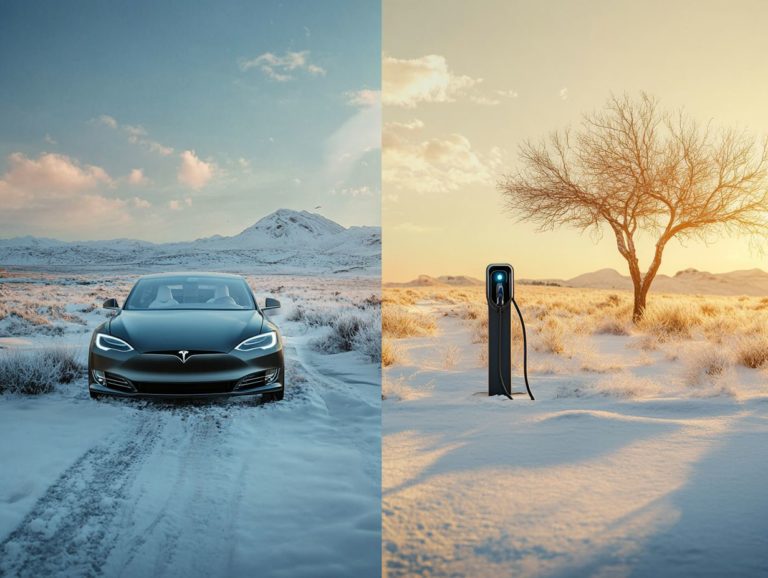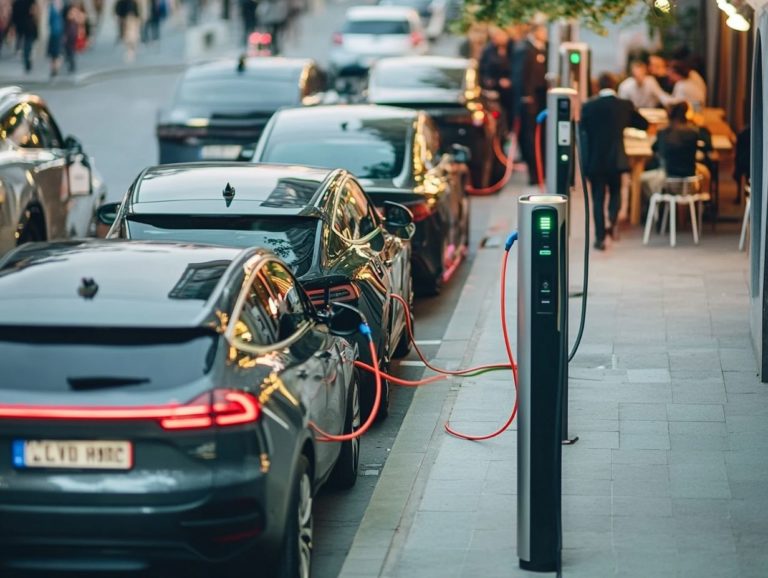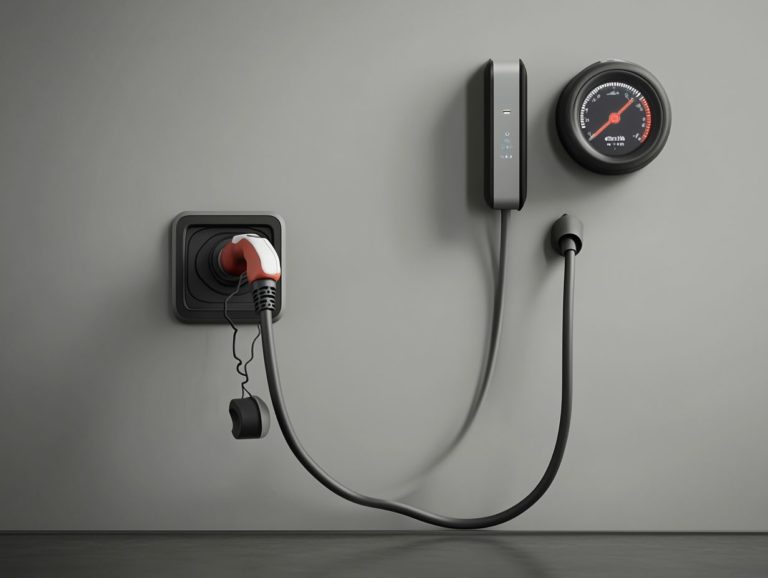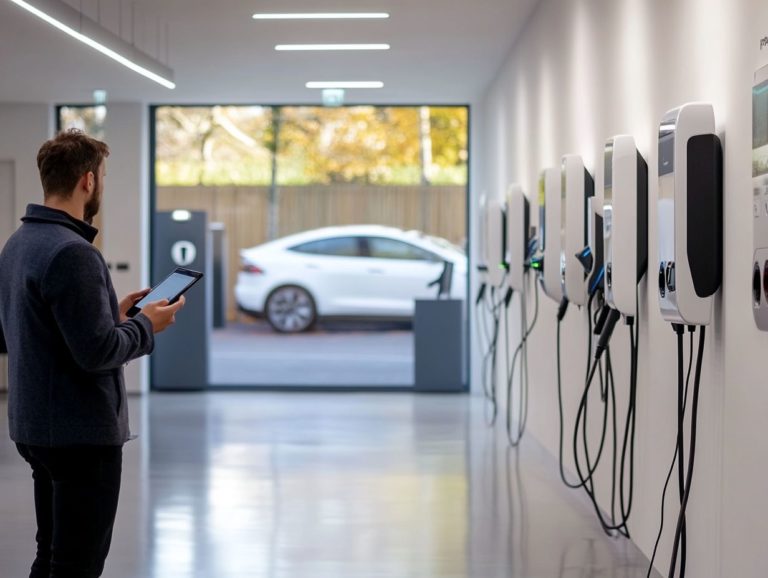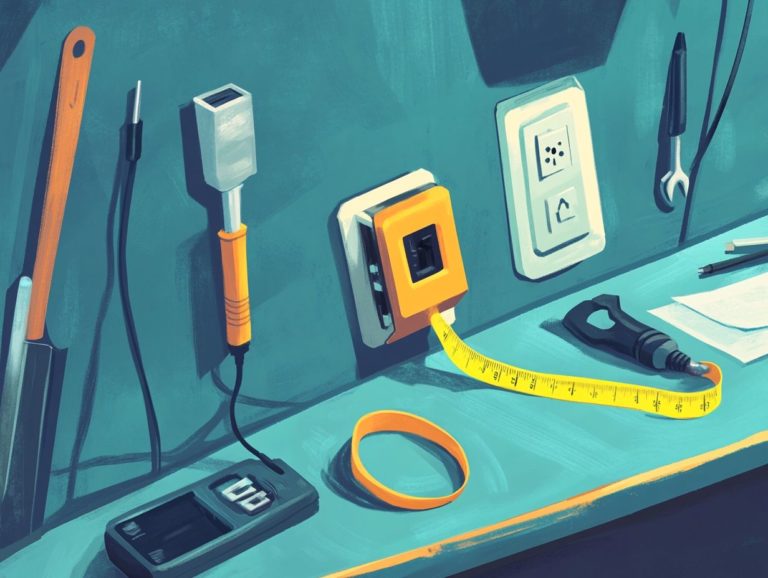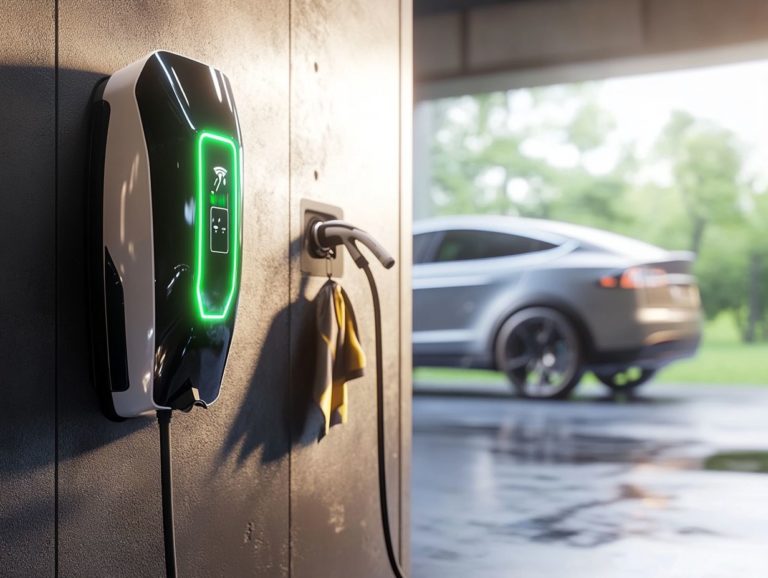EV Charger Compatibility: What You Should Know
As electric vehicles (EVs) gain momentum in the automotive world, understanding the nuances of EV charger compatibility becomes crucial for an effortless driving experience.
Let s explore what compatibility means and why it holds significant importance. You’ll delve into the various types of chargers Level 1, Level 2, and DC Fast Chargers unpacking their differences and applications.
It s vital to consider the factors that influence compatibility, such as the make and model of your vehicle and the available charging speeds. Equip yourself with the knowledge to select the ideal charger for both home and public use, steering clear of potential missteps along the way.
Contents
- Key Takeaways:
- Understanding EV Charger Compatibility
- Types of EV Chargers
- Factors that Affect Compatibility
- How to Determine Compatibility
- Ensuring Compatibility for Home Charging
- Compatibility at Public Charging Stations
- Frequently Asked Questions
- What should I know about EV charger compatibility?
- How can I determine if an EV charger is compatible with my vehicle?
- What happens if I try to use an incompatible EV charger?
- Are all EV chargers universal and compatible with any electric vehicle?
- Can I use an EV charger from a different manufacturer?
- Is it necessary to have a home charging station specifically for my electric vehicle?
Key Takeaways:
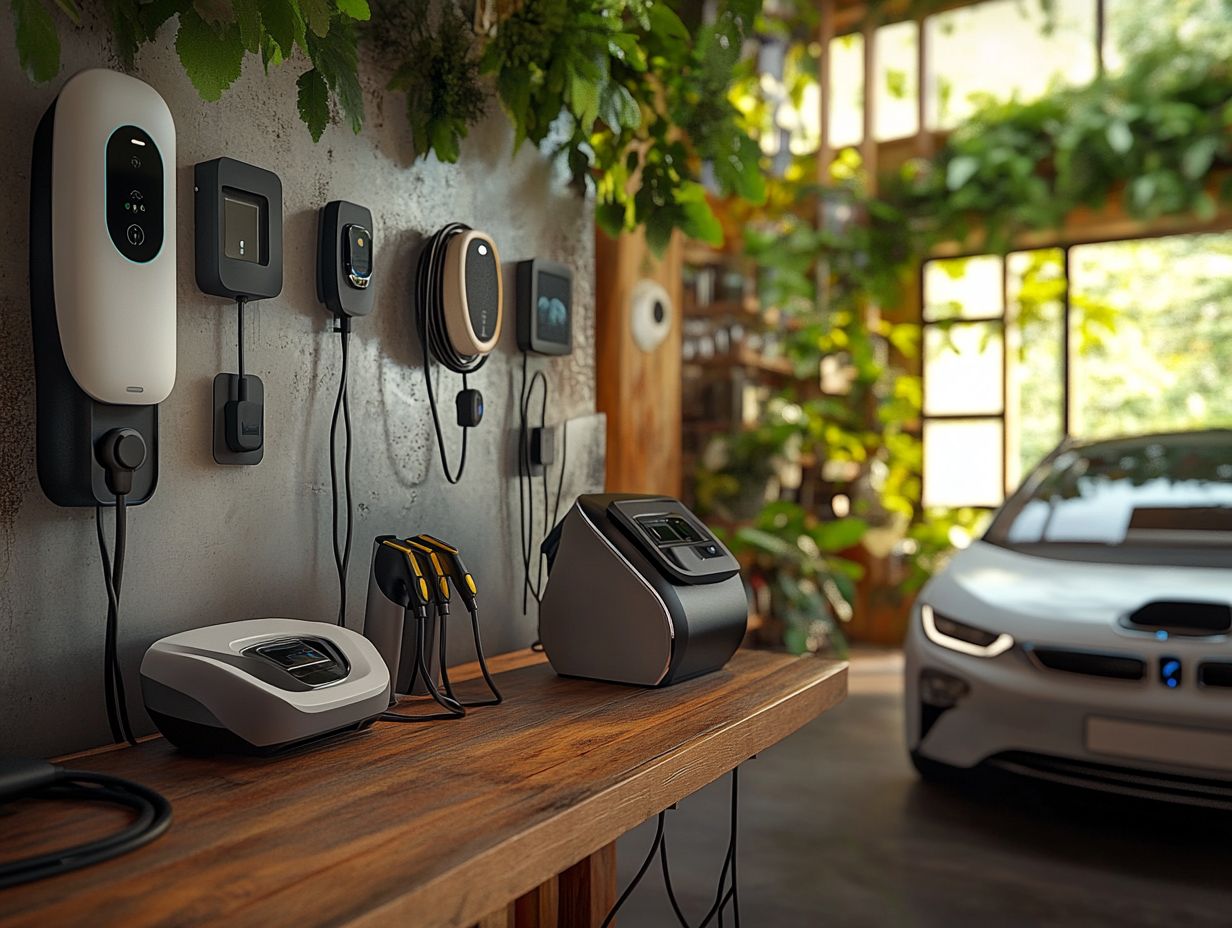
- Understanding EV charger compatibility is crucial for efficient and safe charging of electric vehicles.
- The type of EV charger and the vehicle’s make and model are key factors that determine compatibility.
- Researching and consulting with experts can help determine compatibility and ensure efficient charging at both home and public charging stations.
Understanding EV Charger Compatibility
Understanding EV charger compatibility is essential for you as an electric vehicle (EV) owner, directly influencing your charging experience and convenience. For more insights, consider what you should know about EV charging networks. With the growing popularity of electric vehicles, selecting the right charging solution can significantly enhance your daily driving and long-term vehicle performance.
The compatibility between EV chargers and your vehicle impacts both charging speed and efficiency, which are particularly crucial for high-demand models like the Tesla Model 3. Familiarizing yourself with various connectors, including the CHAdeMO plug a standard for quick charging can alleviate range anxiety and elevate your overall ownership experience.
If you drive a Tesla, you benefit from a robust Supercharger network that allows for rapid charging an absolute game changer for long journeys. On the other hand, if you own a Nissan Leaf, you might find yourself relying more on Level 2 chargers. While these chargers are widely available, they can take longer to deliver a substantial charge.
This variability in charging speeds and efficiencies emphasizes the importance of being proactive in researching which chargers best suit your vehicle’s specifications. Having this knowledge not only elevates your satisfaction as a driver but also enables you to optimize your charging habits. By doing so, you can minimize downtime and enhance your overall experience of electric vehicle ownership.
Types of EV Chargers
You ll find three primary types of EV chargers designed to meet various charging needs: Level 1, Level 2, and DC Fast Chargers. Each type offers unique charging speeds and solutions tailored for both home and public charging situations.
Level 1, Level 2, and DC Fast Chargers
Level 1 chargers, which typically utilize a standard household outlet, are your slowest option for electric vehicle (EV) charging. If you’re seeking faster charging speeds, Level 2 chargers and DC fast charging options will serve you better.
With Level 1 chargers, you can expect to recharge your EV at a rate of about 4-5 miles of range per hour. This makes them perfect for overnight charging at home, especially if your daily commute isn t too long. They excel with plug-in hybrids or electric vehicles with smaller batteries.
If you want to step it up, consider Level 2 chargers, which require a dedicated 240-volt outlet. These powerful chargers can deliver anywhere from 10 to 60 miles of range per hour, providing a great balance between speed and accessibility. They’re ideal for both homeowners and commercial locations, allowing your EV to charge efficiently throughout the day.
DC fast chargers are the champions of rapid charging. They are designed for quick stops along highways or in bustling urban areas. They can give you about 80% charge in just 30 minutes for compatible EVs. While incredibly convenient for long road trips, keep in mind the upfront costs and the need for specific EV models can be significant hurdles.
Factors that Affect Compatibility
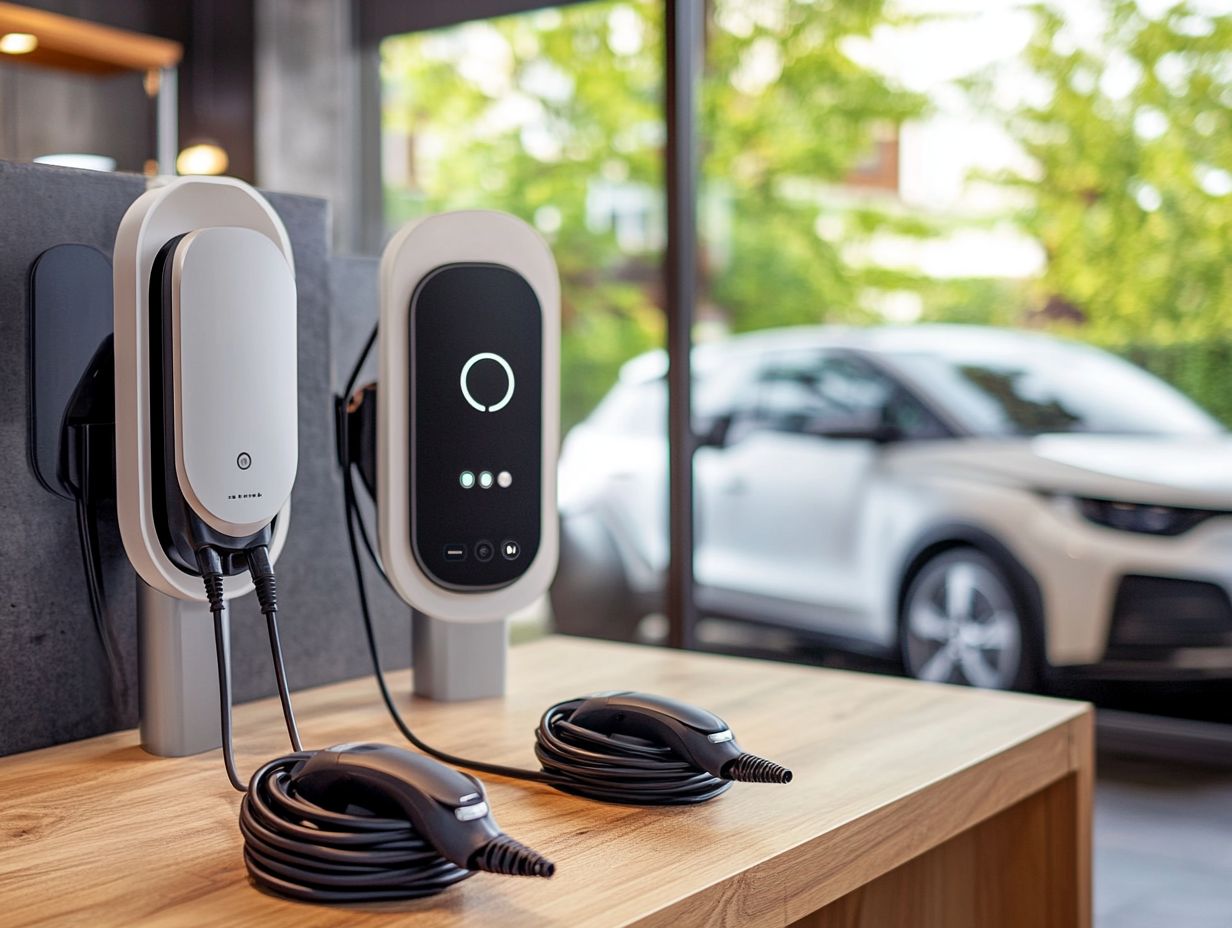
Several factors influence the compatibility of EV chargers with your vehicle. These include the specific make and model of your electric vehicle, the charger’s power, and the charging needs impacting your EV choice to sustain optimal battery range.
Understanding these elements will help you choose the right charger for your needs.
Vehicle Make and Model
The make and model of an electric vehicle are crucial in determining compatibility with various types of EV chargers. To better understand potential expenses, it’s important to consider EV charging costs, as each manufacturer may use different charging ports or standards.
For example, well-known brands like Nissan typically equip their vehicles with Type 1 connectors, while Tesla has developed its proprietary Supercharger network, complete with a unique connector designed exclusively for its lineup.
This variation in charging technologies can complicate your experience. If you drive a vehicle from one brand, access to charging stations that support your specific needs may be limited. You ll need to navigate a landscape filled with various charging networks and converters, which adds to your planning efforts and can also lead to longer wait times at public chargers.
As a result, the widespread adoption of electric vehicles depends on enhancing the availability and convenience of charging infrastructure. This significantly influences your confidence in making the switch from traditional gasoline vehicles.
Charging Speed and Power
Charging speed significantly affects how quickly your electric vehicle recharges its battery. This directly impacts your overall battery range and user experience.
For those using electric vehicles daily, the convenience of rapid charging can elevate your lifestyle. Higher charging speeds minimize downtime during your journeys, seamlessly integrating charging into your routine without the frustration of lengthy wait times.
The presence of fast chargers along popular routes eases concerns about range, giving you the power to explore further with confidence. This newfound flexibility enhances your everyday driving and makes long-distance trips feel like a breeze.
How to Determine Compatibility
Determining whether your electric vehicle is compatible with available chargers requires diligent research and consultation with industry experts. For guidance, you can refer to this resource on how to choose the right EV charger. This approach ensures you discover the optimal charging solutions tailored to your needs.
Researching and Consulting with Experts
Researching and consulting with experts can provide you with invaluable insights into the best EV charging solutions tailored specifically to your vehicle’s needs and compatibility requirements.
By leveraging a variety of online resources ranging from dedicated electric vehicle websites to discussion forums and social media groups you can gather diverse perspectives and firsthand experiences from fellow EV users. Engaging directly with industry professionals is also advantageous, as they often possess the latest information on advancements in charging technology.
Knowing your local charging options is essential for a smooth EV experience! This means being familiar with charging station availability, types of chargers, and the speed of charging options. These factors all play a vital role in giving you the power to make informed decisions about your EV ownership.
Ensuring Compatibility for Home Charging
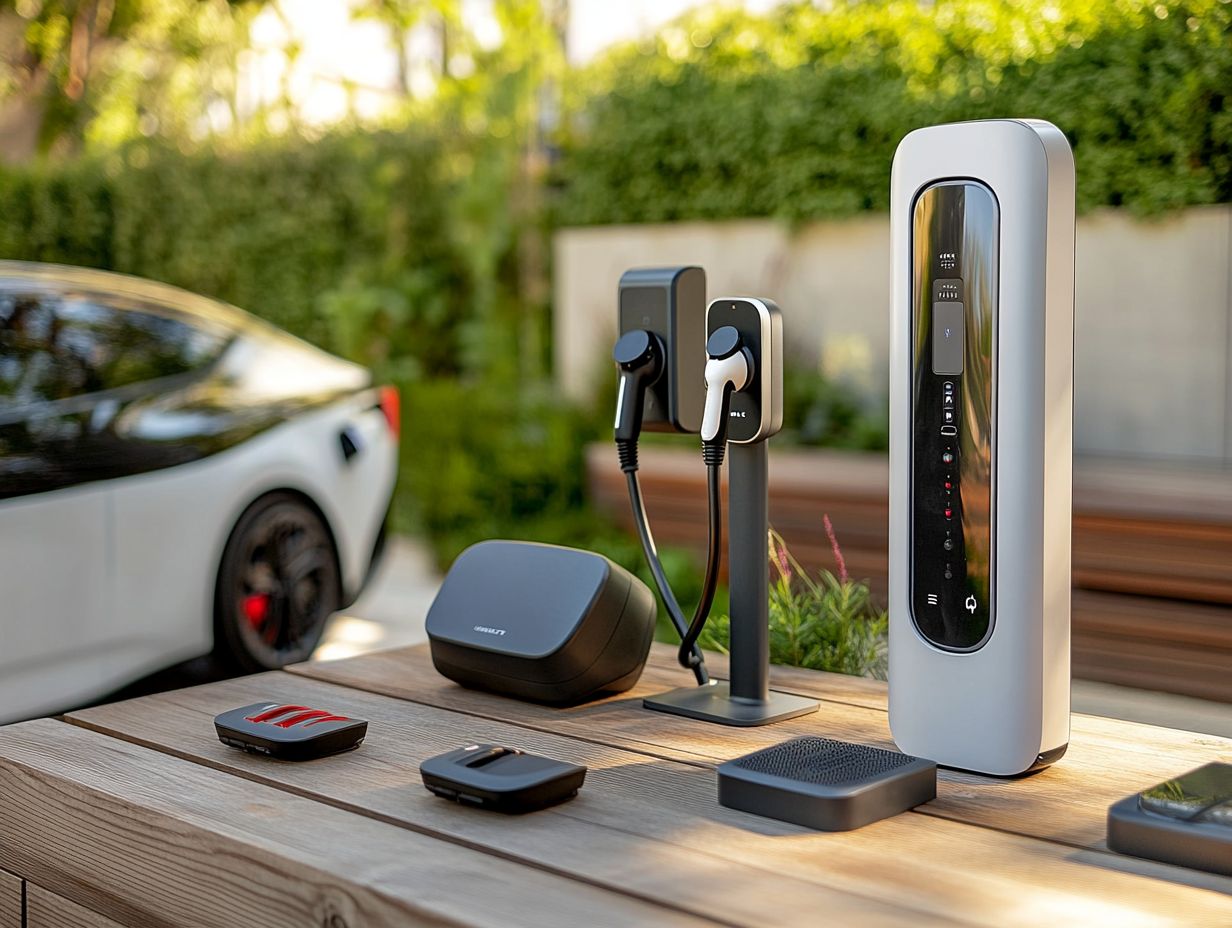
Ensuring compatibility for home charging requires you to select the right EV charger tailored to your electric vehicle’s specific needs and your home’s wiring. This thoughtful approach optimizes charging efficiency, allowing you to enjoy the full benefits of your electric vehicle.
Options for Installing a Compatible Charger
When exploring options for installing a compatible charger at home, it s crucial to assess your electrical capacity and identify the type of charger you need. Familiarize yourself with local installation regulations.
If you prefer to charge your electric vehicle overnight, a Level 1 charger, which is simply a standard household outlet, might be just the ticket. However, if you re looking for a faster charging solution, a Level 2 charger is the way to go. This option usually requires a dedicated circuit and a sturdier electrical infrastructure.
It’s also important to consider installation costs. Choosing professional services can provide you with a safer and more efficient setup. Certified technicians can expertly navigate local building codes, ensuring that the entire process is not only smoother but also more reliable.
Compatibility at Public Charging Stations
Compatibility at public charging stations can pose challenges for electric vehicle owners. Different chargers may not universally support every EV model, impacting both accessibility and convenience for you.
Availability and Compatibility Issues
Availability and compatibility issues at charging stations can significantly disrupt the seamless charging experience you expect as an electric vehicle owner. It s essential to take proactive measures to ensure access.
When charging stations are few and far between or overcrowded, it can lead to frustration for drivers like you who depend on quick and efficient recharging options. The variety of connector types and charging standards, which refer to the different ways EVs can connect to chargers, can further complicate matters.
To navigate these complexities, many EV owners have turned to mobile applications like Zap Map. Don t let charging station availability slow you down! These tools help you locate nearby charging stations that are compatible with your vehicle, alleviating range anxiety and streamlining the charging process.
Frequently Asked Questions
What should I know about EV charger compatibility?
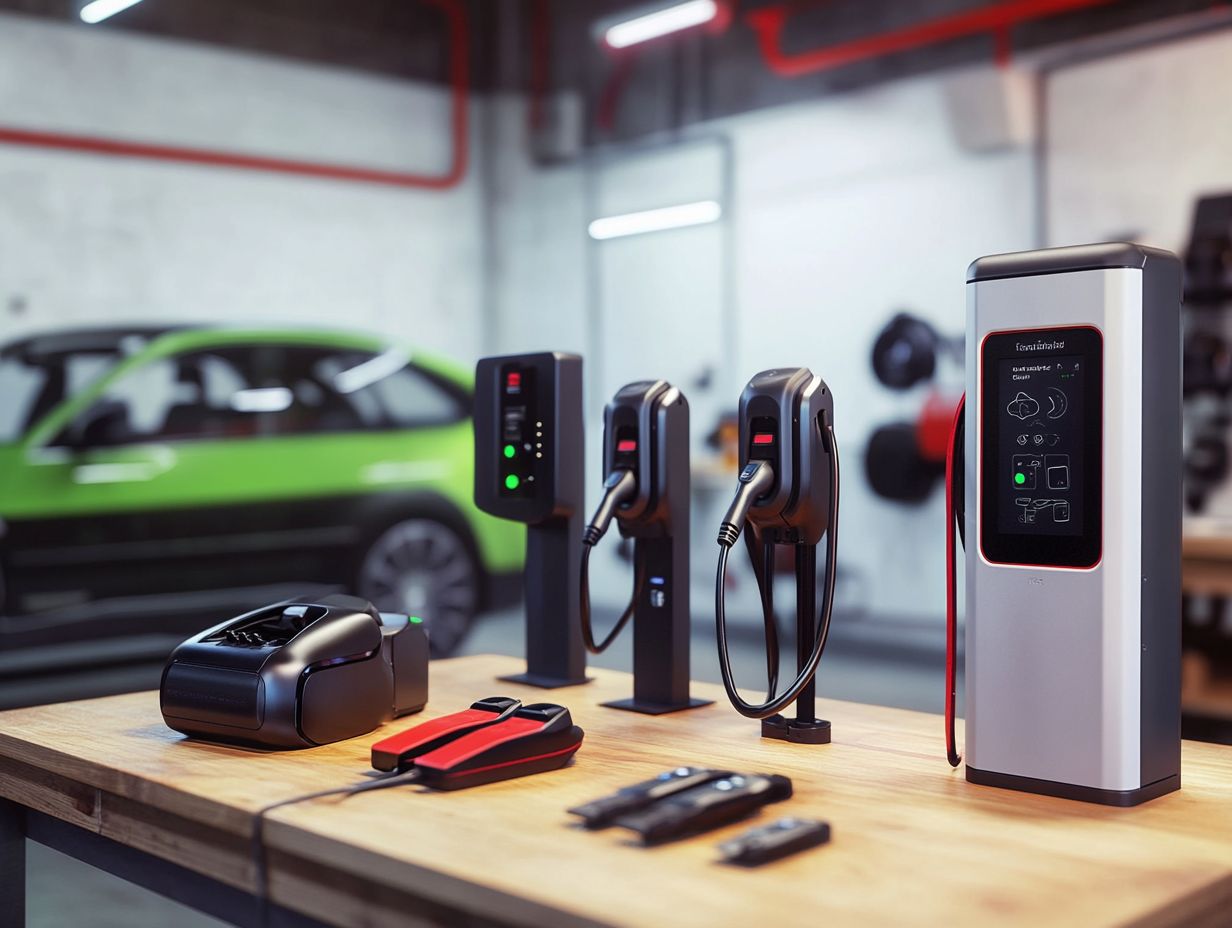
EV charger compatibility refers to the ability of an electric vehicle to connect and charge with a specific charger. This includes both the physical connection and the technical compatibility between the vehicle and charger, which is why it’s important to understand how to choose the right EV charger for you.
How can I determine if an EV charger is compatible with my vehicle?
The best way to determine compatibility is to consult your vehicle’s manual or contact the manufacturer. You can also look for compatibility information on the charger itself or check online resources for compatibility databases.
Get informed, stay charged, and enjoy your electric vehicle journey!
What happens if I try to use an incompatible EV charger?
If you use a charger that doesn t work with your car, it won’t charge. It could also damage both the charger and your vehicle.
Are all EV chargers universal and compatible with any electric vehicle?
No, not every EV charger works with all electric vehicles. Chargers come in different types and connector styles that may not fit your car.
Can I use an EV charger from a different manufacturer?
Yes, you can often use a charger from another manufacturer, provided it fits your vehicle. Always check your vehicle’s manual or reach out to the manufacturer to be sure.
Is it necessary to have a home charging station specifically for my electric vehicle?
You don t have to have a home charging station designed for your car, but it’s a good idea for safe, efficient charging. Many EV makers offer their own chargers, and there are universal options too.

